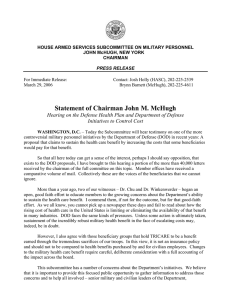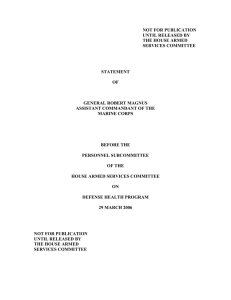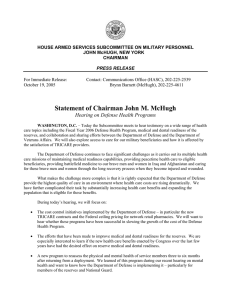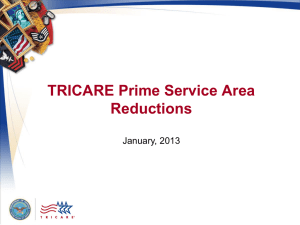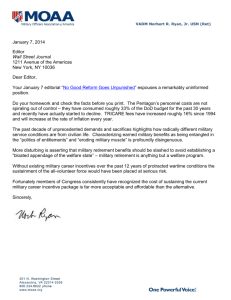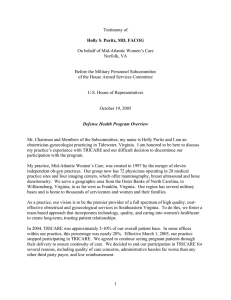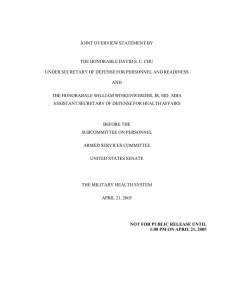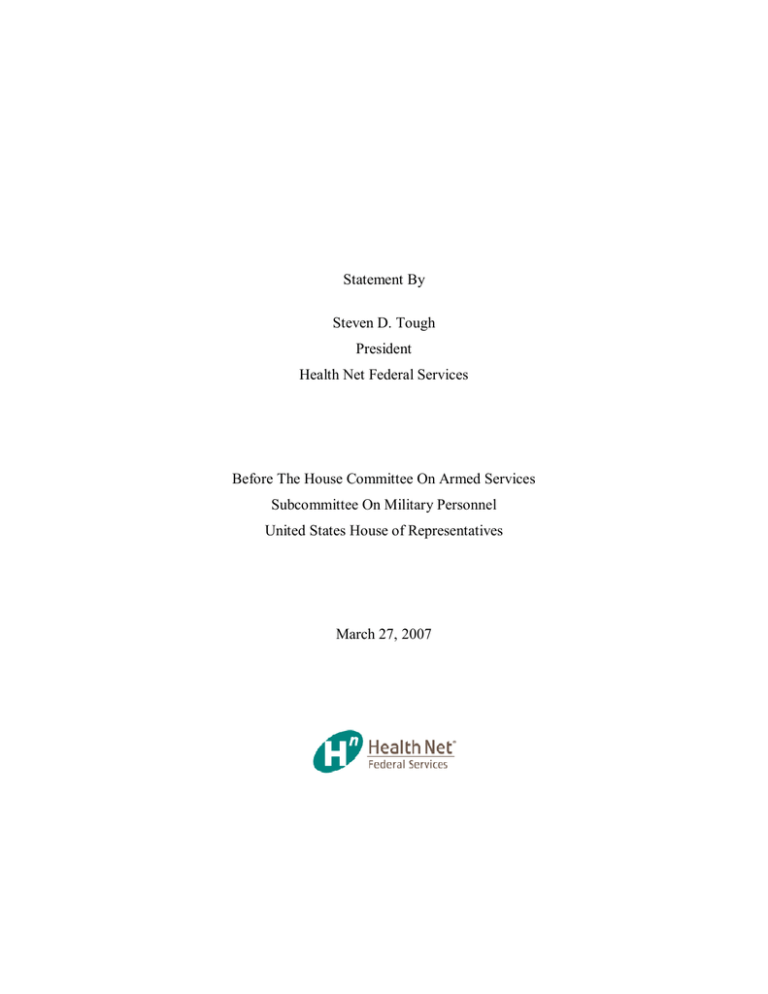
Statement By
Steven D. Tough
President
Health Net Federal Services
Before The House Committee On Armed Services
Subcommittee On Military Personnel
United States House of Representatives
March 27, 2007
Steven D. Tough
President, Health Net Federal Services
Steven D. Tough is president of Health Net Federal Services (HNFS), the government operations
division of Health Net, Inc. HNFS is one of the largest TRICARE Managed Care Support
Contractors, providing managed care services to active duty family members, military retirees
and their dependents. Health Net is among the nation’s largest publicly traded managed health
care companies.
Mr. Tough oversees the day-to-day administration and management direction for HNFS, which
includes preparation for reprocurement opportunities of our TRICARE contract, as well as
strategizing our growth in future businesses that include veterans affairs and other government
funded health care services.
Formerly the president and chief operating officer of Foundation Health Corporation (FHC), a
predecessor company of Health Net, Mr. Tough brings first-hand experience of complex
government programs (CHAMPUS, TRICARE, Medicare, Medicaid, and Veterans Affairs). In
addition, he brings knowledge of Health Net’s organization and people, familiarity with key
players on Capitol Hill and federal agencies, and more than 30 years of health care management
and operational know-how.
Mr. Tough has a long-standing career in the health care industry. He spent 20 years at FHC, nine
of those years as a president and chief operating officer in the Government and Specialty
Services groups. Since leaving FHC in 1998, Mr. Tough started his own firm providing health
care consulting services to a variety of companies, and served as president of the California
Association of Health Plans and MAXIMUS, Inc., a health care services organization.
Mr. Tough earned his Bachelor of Arts in Health and Safety Studies from California State
University, Sacramento; a Master’s of Public Health from the University of Michigan; and is a
graduate of the National HMO Fellowship Program, sponsored by the U.S. Department of
Health, Education and Welfare (now U.S. Department of Health and Human Services), Office of
Health Maintenance Organizations.
Health Net's mission is to help people be healthy, secure and comfortable. The company’s
HMO, insured PPO, POS and government contracts subsidiaries provide health benefits to more
than 7 million individuals in 27 states and the District of Columbia through group, individual,
Medicare, Medicaid and TRICARE programs. Health Net’s subsidiaries also offer managed
health care products related to behavioral health and prescription drugs, and offer managed
health care product coordination for multi-region employers and administrative services for
medical groups and self-funded benefits programs.
2
Introduction
Mr. Chairman and Distinguished Members of the Subcommittee, thank you for the opportunity
to address the state of the TRICARE program – specifically the North Region. It is an honor to
be invited to share our team’s perspectives and experience with you today.
My objective today is three-fold: First, to reacquaint this committee with Health Net Federal
Services (Health Net) and its long-standing commitment to serving the Department of Defense
and its beneficiaries. Secondly, to provide you with an overview of the current state of our
partnership with the Military Health System, the successes that are being achieved, and our use
of tailored and integrated services to enhance quality in the most cost-effective manner. And
thirdly, to share with you our thoughts on ways to further strengthen and advance the TRICARE
program, helping to make this well performing program even more effective at meeting the
health care needs of service members, their families, retirees and their families.
Health Net Federal Services is a division of Health Net, Inc.; one of the nation’s largest publicly
traded managed health care companies. Health Net’s mission is to help people be healthy, secure
and comfortable. The company’s HMO, POS, insured PPO and government contracts
subsidiaries provide health benefits to approximately 6.6 million individuals in 27 states and the
District of Columbia through group, individual, Medicare, Medicaid, TRICARE and Veterans
Affairs programs. Health Net’s behavioral health services subsidiary, MHN, provides behavioral
health, substance abuse and employee assistance programs to approximately 7.3 million
individuals in various states, including the company’s own health plan members and military
service members and their families. The company’s subsidiaries also offer managed health care
products related to prescription drugs, including administering Medicare Part D benefits for more
than 470,000 members nationwide, as well as managed health care product coordination for
multi-region employers and administrative services for medical groups and self-funded benefits
programs.
3
Health Net has a long history of working in partnership with government agencies, including the
Department of Defense, and was one of the first companies in the United States to develop
comprehensive managed care programs for military families. Health Net has served the
Department of Defense since the beginning of the Military Health System, originally operating
under the name Foundation Health Federal Services.
In 1988, we were awarded the first CHAMPUS Reform Initiative contract located in California
and Hawaii. Following the CHAMPUS Reform Initiative, Health Net was awarded three
contracts under the original TRICARE structure of 12 regions and seven contracts. These three
contracts included five regions and 11 states across the country. Through this contract, Health
Net provided managed health care services to over 2.5 million TRICARE beneficiaries for 9
years. In 2003, Health Net was awarded a 5-year contract to administer health care services for
2.9 million beneficiaries in the TRICARE North Region, which encompasses 23 northeast,
southeast and mid-western states, including the District of Columbia.
Maine
Vermont
New Hampshire
Massachusett
Wisconsin
New York
Michigan
Rhode Island
Connecticut
Iowa
(Partial)
Pennsylvania
New Jersey
Ohio
Illinois
Missouri
(Partial)
Delaware
Indiana
West Virginia
Virginia
Kentucky
North Carolina
Tennessee
(Partial)
4
District of Columbia
Maryland
In addition to our North Region contract, Health Net, Inc. also provides behavioral health
counseling services to the Department of Defense through our behavioral health company MHN.
These services include military family counseling, rapid response counseling to deploying units,
victim advocacy services and reintegration counseling.
Health Net also is proud of its partnerships with the Department of Veterans Affairs. Currently,
we provide audit and recovery services; staff, manage and operate 13 community based
outpatient clinics; and administer preferred pricing contracts in each of the Veteran Affairs’
Veterans Integrated Service Networks. Through these various programs, we have helped the
Department of Veterans Affairs save over $150 million since 1999.
Throughout our 19 years of providing managed care services for the Department of Defense, we
have continuously focused on improving, tailoring and integrating our services to be most
responsive to our government customer, meeting the ever changing needs of the Military Health
System and the beneficiaries we serve. As you well know, the health care needs of military
service members and their families – active, retired and reservists – as well as the requirements
of the Military Health System, are unique and distinct from commercial health care in several
ways.
The dual mission of the Military Health System – medical combat readiness and peacetime
health care delivery – is a dramatic departure from the stability experienced in the commercial
health care marketplace. The Military Health System is a very unique blend of military
treatment facilities and contractor health care delivery systems. This unique blend of
complementary and interdependent delivery systems must deal with the significant, concurrent
stresses of on-going military deployments and the pressures brought about by the global war on
terror. The “one of a kind,” synergistic Military Health System has consistently demonstrated its
ability to integrate and to tailor mutually supportive best practices to support and respond to the
varied needs of its diverse beneficiary population. This very nature of the Military Health
System forms the foundation for the success of the TRICARE program; it is a standard
unmatched by commercial health plans.
5
State of the Partnership
I am pleased to report that the state of our partnership with the Military Health System is very
strong. The collaboration between the TRICARE Management Activity, TRICARE Regional
Offices, the military services and the managed care contractors, the solid performance levels, the
high level of beneficiary satisfaction, and the positive survey results of military treatment facility
commanders and staff clearly illustrate the strength of this partnership.
Partnership
In collaboration with the TRICARE Management Activity, the TRICARE Regional Office-North
and the North Region military treatment facilities, substantial programmatic improvements have
been achieved and all stakeholder groups continue to validate an ever-increasing level of
confidence and satisfaction with the quality of service delivery. Health Net continues to focus on
performance excellence and on initiatives that advance the TRICARE program and contribute to
the full realization of the contract objectives in the North Region.
Health Net and the TRICARE Regional Office-North have fostered a strong, collaborative
relationship, ensuring open, honest and transparent communications, a clear understanding of
goals and expectations, and the proper prioritization of initiatives to attain and even exceed the
contract objectives. Health Net, the TRICARE Regional Office-North, and TRICARE
Management Activity are actively working in concert on numerous initiatives to improve health
care cost management and enhance the quality of care for TRICARE beneficiaries. To this end,
in the fall of 2006, Health Net and the TRICARE Regional Office-North cosponsored four
Medical Directors Conferences. Participation in these conferences helped to foster improved
clinical relationships, communications and understanding between the military treatment facility,
TRICARE Management Activity, TRICARE Regional Office-North and Health Net clinical
teams. During these conferences, participants engaged in discussions of local health care bestbuy and best patient management decisions and focused on improving the interoperability of the
direct care and contractor systems in terms of patient and clinical information management.
To further advance collaboration, Health Net has employed an “on the ground” organization with
staff co-located at military treatment facilities and in Multi-Service Market Offices, facilitating
6
face-to-face accountability. This local operational integration is also the centerpiece for ensuring
effective customer service relationships with the beneficiary community. This “on the ground”
operational integration of support services and relationships with military treatment facility
commanders and the beneficiary community is a key driver for enhancing optimization
initiatives, market level planning and stakeholder satisfaction.
We strongly believe these regional and local partnerships are crucial for program success. For
example, in the most recent quarterly award fee survey, Health Net achieved an overall 94
percent level of satisfaction, as measured by military treatment facility commander surveys. We
were able to achieve this level of satisfaction by making collaboration a top priority and by being
closely aligned with the priorities of our government partners – TRICARE Management
Activity, TRICARE Regional Office-North and the military treatment facilities.
Not only do we place a high priority on our customer relationships at TRICARE Management
Activity, TRICARE Regional Office-North and the military treatment facilities, we also maintain
collaborative relationships with the military beneficiary associations, communicating with them
on a frequent basis. These interactions help us to gain insights into how best to meet the unique
needs of the population we serve, to identify areas for increased beneficiary and provider
education, and to address individual beneficiary and provider concerns. Working with the
military associations also provides us with forums for discussing the current state of TRICARE
and for providing information and updates on the program. We believe this collaborative
relationship is a win-win: We share valuable program information that the associations share
with their members – TRICARE beneficiaries – and we in return learn how we can improve our
services to better meet the needs of those we serve.
In addition to our collaborative efforts with the government and beneficiary groups, this past
year Health Net formed a TRICARE Advisory Committee composed of retired service members
with extensive senior leadership experience within the Department of Defense and the Military
Health System community. The Advisory Committee’s strategic guidance is particularly
valuable in our efforts to develop operational and customer relation solutions to provide those
who serve, and their families, with unsurpassed health care.
7
Health Net remains committed to fostering and maintaining these collaborative relationships
with all key stakeholders. Our mission is to complement and maximize, not circumvent, the
existing military health infrastructure and to deliver coordinated, quality health care.
Performance Excellence
In addition to the strength of the partnership with the government customer and TRICARE
beneficiaries, the levels of contract performance also validate our assertion that the state of the
TRICARE program is strong.
Claims Processing – Under the current TRICARE contracts, significantly greater emphasis has
been placed on minimizing administrative costs associated with claims processing. Health Net
now obtains nearly 78 percent of network provider claims electronically and almost 62 percent of
all TRICARE North claims – network and non-network. We also promote the use of web-based
claims processing by providers, and now receive over eight percent of all claims over the web.
As the volume of claims being submitted continues to increase – claims processing receipts for
2006 were seven percent higher than 2005, and we expect 2007 claims to exceed 2006 total – our
continued pursuit of electronic claims will be vital to controlling program administrative costs.
Additionally, Health Net also has placed great emphasis on paying providers promptly. We
recognize that many providers view TRICARE reimbursement rates as being lower than
commercial rates. To help mitigate this concern and to encourage provider participation in
TRICARE, we try to improve providers’ cash flow by promptly processing and paying claims.
Of the more than 1.1 million claims we receive a month, more than 99.99 percent are adjudicated
and paid within 30 days of receipt. In fact, Health Net requires only an average of 5.6 days from
receipt to process and pay claims submitted electronically, 12.7 days for paper claims and 2 days
for web-based claims. In promptly processing and paying more than 13 million claims annually,
Health Net has not compromised accuracy for speed – we maintain error rates that are
consistently better than contract standards.
Customer Service – Health Net’s toll-free telephone service is the primary source for
beneficiaries and providers to obtain TRICARE program information and to seek resolution to
difficulties being experienced. This toll-free customer service line provides beneficiaries and
8
providers with direct access to company representatives 12 hours a day, 5 days a week (Monday
through Friday, excluding federal holidays). Additionally, most services offered by Health Net’s
representatives are available 24 hours a day, 7 days a week using an integrated voice response
system. Through this system, callers can obtain program information, check the status of claims
and referrals/authorizations, verify eligibility, pay enrollment fees and more, whenever it is most
convenient for them to do so.
In 2006, Health Net received nearly 4.4 million calls from TRICARE North Region beneficiaries
and providers. The majority of these calls were routine requests regarding benefit information,
coordination of care, including authorizations and referrals, and claims status. On average,
callers were connected to a customer service representative in 4 seconds. Moreover, more than
95 percent of all calls received were answered by a representative within 30 seconds. Health
Net’s immediate availability to beneficiaries and providers is complemented by its content
management program that ensures information provided is current and accurate. Consistent,
reliable and accurate information is made possible through the use of scripts, hyperlinks and
decision tree formats with indexing and taxonomy to expedite information searches.
Enrollment – The TRICARE enrollment application and process are complex and occasionally
the source of frustration for beneficiaries. Health Net has introduced web-based tools that lessen
the complexity of the enrollment process, improve the accuracy of submitted information and
expedite completion time. These web-based tools are available 24 hours a day, 7 days a week,
365 days a year. Through these tools, beneficiaries have the ability to select or make a change to
their primary care manager. They also can determine whether they live within a Prime service
area and if so, identify the enrollment requirements of their Prime service area. This latter tool
incorporates the enrollment criteria specific to each military treatment facility and includes
military treatment facility addresses and telephone information.
Promptly enrolling beneficiaries in TRICARE Prime helps to ensure they have quick access to
comprehensive health care services. To that end, Health Net processes complete enrollment
applications and other related transactions within 5 business days of receipt. Portability
transactions – when a beneficiary transfers or moves from another TRICARE region to the North
Region – are processed within 4 days of receipt. As with claims processing, not only do we
9
process enrollment applications quickly, we do so with great accuracy. In 2006, Health Net
processed nearly 375,000 enrollment requests with accuracy rates hovering near 99 percent, well
above health care industry standards. We continue to work closely with our government partner
to further refine the enrollment process to enhance beneficiary service and satisfaction.
Referrals and Authorizations – In another effort to improve provider relations and to minimize
the “hassle factor,” Health Net processes referral and authorization requests promptly. We
continue to process referral and authorization requests within contract standards, and often
exceed them. By way of example, more than 99 percent of all routine physician referral requests
are completed within 2 days against a standard of 85 percent. Similarly, over 97 percent of
requested authorizations for medical procedures are processed within 2 days against a contract
standard of 90 percent.
As a part of our commitment to support the Military Health System in its medical readiness and
Graduate Medical Education missions, based on an military treatment facilities capability and
capacity, 100 percent of all appropriate referrals that occur within the military treatment facilities
service area are forwarded to that military treatment facility for first right of refusal. For the past
12 months, nearly 4.5 of every 10 opportunities for military treatment facility recapture were
successful because the military treatment facilities’ capability and/or capacity could accept the
care, thereby supporting the Military Health System mission and providing quality care in the
most efficient setting.
Case Management – Our case management program provides individualized assistance to
beneficiaries experiencing complex, acute or catastrophic illnesses or that have exceptional
needs. Health Net’s case management program focuses on early identification of high-risk
beneficiaries and applies a systematic approach to coordinating all aspects of care. It is common
for case managers to address a myriad of issues with the patient beyond their medical needs,
including behavioral, psychosocial, environmental, cultural and financial.
There are typically 650 ongoing comprehensive cases under our management in the program.
These are split between physical health and behavioral health cases – approximately 85 percent
are physical health cases and 15 percent are behavioral health. Approximately 80 cases are
10
opened each month, and a similar number are closed out after the patient achieves the mutually
determined goals for return to health that the patient and case manager set when the case was
opened.
In terms of outcome, 95 percent of beneficiaries say their expectations were met or exceeded
under this program. And in a 2006 study of the program to a control group, the quality of care
was sustained or improved while the cost of care was 18.8 percent less than in the
comprehensively case managed group. This cost efficiency is due to reduced readmissions to
facilities, appropriate use of urgent or emergent care sites, enhanced beneficiary education and
better coordination of care with the patient’s care providers.
Transitional Care – Health Net’s Transitional Care program minimizes gaps in care and supports
beneficiaries with episodic care needs as they transition from one level of care or service to
another. This concurrent review activity often begins with the interaction between Health Net’s
RN and an inpatient facility’s caseworker or discharge planner.
In 2006, Health Net’s Transitional Care nurses assisted more than 42,000 beneficiaries with a
range of services – from being available for questions or help when asked, to comprehensive care
coordination with the patient and family to ensure the best outcomes possible for the patient.
Provider Access – Our managed care network is robust. Currently there are nearly 100,000
contracted TRICARE providers servicing nearly 2.9 million eligibles and 1.4 million enrolled
beneficiaries. The number of network providers has increased by 35, 000 since the start of
service delivery in September 2004 – a 53 percent increase.
Network adequacy is measure monthly, by specialty and service types, to identify any need for
expansion or enhancement of specialties, which in turn, ensures access goals are being met.
During 2006, 97 percent of all civilian generated referral requests within Prime service areas
were completed to network providers or to a military treatment facility.
Every instance of a non-network referral is tracked, explained and used to understand and
enhance the North Region network through ongoing development. As a result of this effort, the
11
overall network grew by 14 percent in 2006. New, sophisticated mapping software in Health Net
support systems is materially improving provider access by enabling better referral decisions
using actual drive times to provider offices. Using this tool, Health Net has committed to
reducing drive times for enrolled beneficiaries in Prime service areas by 50 percent, thereby
improving their access to care and improving satisfaction with the program.
Our Prime service areas contain 80 percent of all contracted network providers and cover 83.6
percent of the eligible TRICARE population. Although Prime enrollment is not offered in nonPrime Service Areas, Standard beneficiaries still benefit from our robust network. Since nearly
17 percent of the total contracted provider network is in non-Prime service areas, this makes the
Extra plan option more attractive to them. Having a viable Extra benefit in non-Prime service
areas benefits both the beneficiary and the government by offering quality, cost-effective
services. The balance of the network (three percent) is outside the North Region but provides
services to North Region beneficiaries in special care circumstances, or in adjacent urban
markets, such as Nashville, Tennessee and St. Louis, Missouri.
Beneficiary Satisfaction
Beneficiary satisfaction with the TRICARE program remains very high, higher than with
commercial or other government agency health programs, according to a recent survey by
Wilson Health Information.
In September 2006, Wilson Health Information announced results from the 2006 WilsonRx
Health Insurance Satisfaction Survey. Of all the plans and programs included in the Wilson
Survey, TRICARE was the top rated health insurer in member satisfaction for the fourth straight
year.
The survey found that nearly all TRICARE enrollees are satisfied with their health insurance,
with 56 percent surveyed indicating they are highly satisfied. In fact, overall satisfaction with
TRICARE was higher in 2006 than in previous years. Specific areas of service in the TRICARE
program that received the highest marks include:
12
•
Re-enrollment
•
Overall quality of medical care received
•
Overall quality of health care providers
•
Choice/coverage of hospital care
•
Claims paid in a timely/hassle-free manner
•
Courteous/helpful plan representatives
•
Plan representatives answer questions/solve problems
Overall Beneficiary Satisfaction with Health Insurance Plan
Highly satisfied
Satisfied
TRICARE
Dissatisfied
Highly dissatisfied
56%
42%
Kaiser Permanente
43%
52%
Harvard Pilgrim
41%
56%
AARP
39%
HIP
4%
57%
35%
61%
4%
BC/BS
29%
63%
7%
GHI
29%
63%
8%
MAMSI
28%
63%
8%
UnitedHealthcare
26%
65%
8%
Aetna
25%
67%
8%
Medical Mutual
25%
CIGNA
24%
Humana
Coventry
Oxford
65%
63%
22%
69%
19%
70%
15%
72%
10%
12%
8%
10%
10%
Source: Results for those health plans with more than 100 respondents in the WilsonRx survey sample for the 20 complete states
in the North Region. Health Insurance Satisfaction Survey (2006) Wilson Health Information, LLC, New Hope, PA – All Rights
Reserved. Used with permission.
In addition to the Wilson Survey results, the regional director for the TRICARE Regional OfficeNorth office determines our quarterly performance rating through a variety of surveys, which
13
include three key stakeholder groups – beneficiaries, military treatment facility commanders and
TRICARE Regional Office-North division chiefs. Beneficiaries selected to participate in the
quarterly survey are those that have had contact with Health Net’s administrative touch points
(claims, TRICARE Service Centers, enrollment, etc.) within the past quarter. For the past five
quarters, overall beneficiary satisfaction levels have averaged in the 87 – 88 percent range,
meaning that beneficiaries are either somewhat satisfied, very satisfied or completely satisfied
with Health Net’s administration of the program.
Military Treatment Facility Commander Satisfaction
The TRICARE Regional Office-North surveys of military treatment facility commanders have
shown the North Region military treatment facility commander satisfaction continues to grow
and currently is very strong. For the past five quarters, overall military treatment facility
satisfaction has averaged 86 percent. However, we are pleased to note that during the most
recent performance rating quarter (October – December 2006), Health Net received a record 94
percent satisfaction rate from North Region military treatment facility commanders. In three of
the past five quarters, Health Net’s Northeast sub-region was recognized for providing 100
percent commander satisfaction.
Customer Tailored Services
Through our 19 years of experience in working with the Department of Defense and our 8 years
of providing services to the Department of Veterans Affairs, we have learned the value of
aligning our services with the objectives and specific needs of our government customer. Our
emphasis on tailoring services for the specific customer and population we serve, coupled with
our emphasis on integrating best practices, allows us to deliver the most effective, most efficient
services possible.
Support for Active Duty Service Members
While active duty service members receive most of their health care from the direct care system,
we do provide a number of important support services.
14
National Capital Area, Multi-Service Market Area – As the TRICARE North Region managed
are support contractor, Health Net has been actively engaged with the Walter Reed Army
Medical Center and the other eight military treatment facilities located in the National Capital
Area, Multi-Service Market Area. We provide an extensive network of civilian health care
providers to augment services at each military treatment facility. Health Net operates a
TRICARE Service Center on site at each military treatment facility to provide customer service,
including enrollment, claims and referral assistance. The TRICARE Service Center at Walter
Reed Army Medical Center averages over 600 beneficiary visits, including active-duty service
members, per month. We provide a full range of medical management support to Wounded
Warriors and all other Military Health System beneficiaries referred outside of Walter Reed
Army Medical Center or other military treatment facilities for care within the civilian network.
These services consist of general civilian care coordination, benefit review and customer support,
care coordination and tracking with Walter Reed case management, transitional care, case
management and discharge planning.
In support of the Army’s response to recent concerns at Walter Reed Army Medical Center,
Health Net volunteered and was invited to participate in various committees and “Tiger Teams”
with responsibility to assess processes and develop solutions for implementation where
appropriate. Additionally, our medical management and field operations team is assisting with
training Wounded Warrior Training Brigade case managers. In addition, MHN Government
Services, our sister company, has readied three licensed clinical social workers to provide
additional social service support at Walter Reed. MHN has identified additional experienced
consultants who can be made available on short notice. These social work consultants are
experienced in providing non-medical, supportive consultation to service members and their
families, including Reserve Component members, throughout the United States and at military
installations overseas.
At the Department’s request, Health Net is prepared to provide additional services to support
Walter Reed Army Medical Center and our nations Wounded Warriors.
15
Reintegration – In response to reintegration and redeployment needs, increased regional support
has been provided within key Military Health System areas (Ft. Drum and Ft. Campbell) where
significant numbers of returning troops necessitated greater support for health care access and
coordination (for active-duty members and their families).
In the summer of 2006, over 75 percent of the 101st Airborne Division (Air Assault) returned to
Ft. Campbell and began the process of reintegration. An intensive joint planning process –
military treatment facility, Health Net and TRICARE Regional Office-North – resulted in an
efficient use of soldier time in accomplishing the "must do" tasks en route to a well-deserved
period of block leave. Family members also were assisted during 17 jointly conducted
Reintegration Dependent Briefing Fairs.
Mental Health Support – Our sister company, MHN, provides behavioral health services to
active duty and Reserve Component members and their families. Through its Military Family
Counseling Services contract, MHN provides short-term, face-to-face problem resolution for
military personnel and their families with over 150 counselors on site at military installations
across the United States and overseas. The program strives to empower them to manage the
stress of the deployment cycle, high op-tempo and changing military environment. The program
offers positive support for the readiness and retention of service members and their families, as
well as supporting reintegration to home base, civilian community or their next deployment.
MHN also serves as the contractor for the Department of Defense’s Victim Advocacy Program.
Through this program, MHN places victim advocates at or near over 50 military installations
throughout the United States.
Collaboration with the Direct Care System
One of the methods we use to tailor our services to meet the customer’s objectives is the
development of strong, collaborative relationships with each military treatment facility
commander in the North Region. This collaboration and tailoring of services is critical to our
mutual success.
16
The central focus of our network design is the military treatment facility. To achieve military
treatment facility optimization – the number one program objective under the current TRICARE
contracts – we need to ensure military treatment facilities are used most appropriately, whenever
clinical capability and capacity exists. Health Net’s local, on-site teams, which we discussed
earlier, help us to achieve these optimization goals by working closely with the military
treatment facility commander and staff.
Our goal is to fill every appointment and bed available within the military treatment facility with
the appropriate patient based on the capacity and capabilities of the military treatment facilities
readiness and training requirements, as defined by the military treatment facility commander.
The ultimate optimization focus is the increased use of the military’s direct care system to
achieve mission readiness. Our civilian network is designed to enhance and augment each
military treatment facilities capacity.
Some specific examples of our efforts to collaborate with our military treatment facility partners
to help them optimize their facility, as well as the overall Military Health System, include
helping to develop a cardiology recapture initiative in the National Capital Area Multi-Service
Market, assisting in expanding the capacity of the Camp Lejeune birthing center, helping Ft.
Campbell with their comprehensive reintegration effort for returning members of the 101st
Airborne Division, and coordinating the first joint base health care forum between all of the
military services providing care in the New Jersey and eastern Pennsylvania communities.
Guard and Reserve Component Outreach and Support
Educating the Reserve Component about TRICARE benefits is an important aspect of Health
Net’s responsibilities. There are a number of venue in which we interact with Guard and
Reserve members and their families, but among the most important are pre- and post-deployment
“just in training” sessions.
Outreach – In the past 14 months, over 55,000 Guard and Reserve members and their families
throughout the TRICARE North Region have been briefed on their TRICARE benefit. Health
Net’s staff at TRICARE Service Centers communicate and liaison with the Family Readiness
17
Coordinators/Family Readiness Groups and State Benefits Advisors to support the present level
of Guard and Reserve briefings and support requirements.
Health Net encourages Reserve Component units to request TRICARE briefings for their
members and families to ensure they are well informed about their TRICARE benefit prior to
even being activated for deployment. In addition, though, we provide TRICARE benefits
briefings and reinforce training at mobilization and demobilization sites. Although the focus is
on mobilization and demobilization, there are many opportunities for Reserve Component
members and their families to learn about their TRICARE benefit.
In addition to support outreach efforts, we recently appointed a retired senior non-commissioned
officer to the Health Net Federal Services TRICARE Advisory Committee to better help us with
our Reserve Component outreach and understanding. The TRICARE Advisory Committee was
formed to provide guidance and support in achieving and maintaining operational excellence to
Health Net Federal Services’ leadership.
Command Sergeant Major John J. Leonard, Jr. was appointed to the committee in March of this
year. Command Sergeant Major Leonard served as the first Senior Enlisted Advisor assigned to
the Office of the Chief, National Guard Bureau and Senior Enlisted Advisor to the Assistant
Secretary of Defense for Reserve Affairs. Command Sergeant Major Leonard brings a wealth of
Reserve and National Guard experience and expands the breadth of the committee’s expertise.
Support – We remain flexible in meeting the needs of this unique population. One example of
our efforts to support the Reserve Component was the addition of a TRICARE Service Center at
Westover Air Reserve Base (ARB) in Springfield, Massachusetts. Westover ARB is the largest
Guard and Reserve installation in New England. Health Net identified 3,000 TRICARE
beneficiaries who are enrolled in TRICARE Prime out of 16,331 who are eligible in the
Springfield expanded Prime service area. We believe that expansion of this TRICARE Service
Center at Westover ARB will better serve the TRICARE eligible, Reserve and Guard
beneficiaries in the Springfield area.
Rapid Response Counseling – Our sister company, MHN, provides on-demand consultants that
coordinate services with unit commanders to support National Guard and Reserve members and
18
their family members. Primarily through 1- to 2-day events that occur during drill weekends,
these consultants provide group and individual consultation, presentations and informal support
typically focusing on how to best cope with the stresses of deployment or reintegrate to civilian
lives after deployment.
Some examples of this rapid response counseling include:
January 2007 - Within minutes of receiving the requirement, multiple counselors
were dispatched to deliver services to the National Guard in the Virgin Islands to help
cope with the anxiety that stemmed from the deaths of two comrades, coupled with
the prospect of redeployment.
January 2007 - Within 12 hours of receiving the request to support the Minnesota
National Guard Family re-integration program in Brainerd, Minnesota, MHN
provided counselors to help cope with the sudden and unanticipated extension of the
34th Infantry Division. The extension was a 125-day extension of National
Guardsmen that already had been deployed for 15 months. MHN immediately sent
six consultants and MHN leadership to Brainerd to provide support to the family
members of the deployed service members.
Cost and Quality Initiatives
Health Net has a quality program that supports performance excellence through application of
the industry best practices for quality management and continuous quality improvement. The
framework for our quality program is based on the International Organization of Standardization
(ISO) 9001:2000 standard and is complemented by the standards established by URAC. Health
Net Federal Services has been an ISO 9001:2000 registered company since 2004. We also hold
three URAC accreditations –Health Network, Utilization Management, and Case Management.
We have a dedicated Quality Office that is responsible for the program and for deploying quality
practices throughout the organization. At Health Net, quality is an “everybody” responsibility.
Ft. Drum Regional Health Planning Organization
In response to Northern New York’s persistent health care issues, issues that impact the Ft. Drum
community, Congress authorized a pilot project to study how military and civilian health care
19
resources can best deliver high quality care to all patients in the Ft. Drum community. Created
in Section 721 of the Fiscal Year 2005 National Defense Authorization Act, the Ft. Drum
Regional Health Policy Organization, a not-for-profit corporation, is carrying out the pilot
program’s regional healthcare approach to meet the needs of the expanding military population,
building on existing relationships between Ft. Drum and the local community.
A Board of Directors guides the Ft. Drum Regional Health Policy Organization. In addition to
the Board, the Ft. Drum Regional Health Policy Organization has four committees:
•
Behavioral Health, including chemical dependency
•
Emergency Medical Service and disaster preparedness
•
Access to care and manpower needs
•
Quality standards
From the start of the project, Health Net has provided support to the Ft. Drum Regional Health
Policy Organization and its committees:
•
Health Net leadership partnered with the Ft. Drum leadership to host a “Doctors’ Day”
and “Provider Summit” at Ft. Drum in April 2005. These events were key “Primers” for
future Ft. Drum Regional Health Policy Organization activities.
•
Health Net’s Field Operations Director is an active member on the Behavioral Health
Committee. Additionally, the entire local field team serves as a continual resource for the
Ft. Drum Regional Health Policy Organization.
•
Health Net provided a $15,000 charitable donation to the Ft. Drum Regional Health
Policy Organization on April 6, 2006, marking the first time funding was provided to the
organization. On April 16, 2007, Health Net will make an additional contribution of
$20,000.
•
Our staff has educated the Quality Committee on TRICARE network quality standards.
The Committee will use these standards to assist with developing community quality
standards to the Ft. Drum Regional Health Policy Organization Board of Directors.
•
In our continued support of the Ft. Drum Regional Health Planning Organization, Health
Net developed a comprehensive provider gap analysis for the entire community –
20
TRICARE and non-TRICARE – in the Ft. Drum Prime service area. Health Net
employed Milliman Consultants and Actuaries to assess medical assets needed to
adequately serve the Ft. Drum community. Health Net’s analysis compares a complete
inventory of all available providers in the area against the calculated need determined by
the Milliman report. This analysis is being used today by the Ft. Drum Regional Health
Policy Organization to improve the community’s health assets, which will directly
improve the care provided to all TRICARE beneficiaries in the Ft. Drum Prime service
area.
•
In collaboration with the Ft. Drum Medical Department Activity, MHN and the local
community, Health Net is developing a behavioral health solution for the Prime service
area.
All committees are working diligently towards providing substantive reports to the Ft. Drum
Regional Health Policy Organization Board of Directors in support of the final report due to
Congress in July 2007. Health Net appreciates the opportunity to be a part of a program that
greatly benefits both the military and civilian communities.
Pharmacy Initiatives
Responsibility for the administration and operation of the retail and mail order pharmacy
programs was “carved out” from the managed care support contracts and separate pharmacy
contracts were procured and awarded. This resulted in the unintended consequence of limitations
on the ability to manage beneficiary prescription drug utilization. Health Net was invited to
participate in support of a Department of Defense initiative to increase TRICARE Mail Order
Pharmacy utilization by decreasing reliance upon the retail venue. Health Net implemented a
multifaceted approach at no cost to the government in support of this important initiative.
The Health Net approach consists of the following components:
•
Educational efforts targeted to beneficiaries in our disease management, case
management, and transitional care programs.
•
Adding an informational message to all Explanation of Benefits explaining the benefit of
using the TRICARE Mail Order Pharmacy.
21
•
An educational program that is targeted to our high volume providers with low
TRICARE Mail Order Pharmacy penetration.
•
Offering e-prescribing tools to a select group of network physicians.
These efforts have resulted in a demonstrable increase in TRICARE Mail Order Pharmacy
utilization within the North Region – TRICARE Mail Order Pharmacy usage in February 2007
was 25 percent higher than the TRICARE Mail Order Pharmacy usage was in February 2006.
We have begun discussions with Department of Defense representatives to discuss other joint
activities that could be undertaken to better manage the prescription drug benefit.
Disease Management - Decision Power
Health Net has participated in active discussions with Department of Defense, TRICARE
Management Activity and TRICARE Regional Office-North senior leaders to explore new
approaches to improving the quality of health care provided to TRICARE beneficiaries while
reducing health care costs. As part of these discussions, Health Net has provided information
concerning our commercial Decision PowerSM program. Decision PowerSM is an enhanced
disease management and consumer empowerment service offering from Health Net, Inc., which
has over 3 years of practical application in our commercial managed care markets across the
country.
As a Decision Support program, Decision PowerSM leverages Shared Decision-Making® based
health coaching and the supporting educational materials (including telephonic, internet, mail,
and video) to foster individual skills and confidence. This allows members to manage their own
health, navigate the healthcare system, and have productive interactions with their physicians.
When fully informed and acting as partners with their physicians in decision-making,
beneficiaries tend to choose more appropriate interventions relative to their individual situation,
compared with beneficiaries who do not receive this information or collaborate with their
physicians.
22
Health Net will continue to work with Department of Defense in setting up an appropriate pilot
and control group in order to test the concepts of this commercially proven service in a
TRICARE setting. In doing so, it will be paramount that a pilot of Decision PowerSM be
structured in a way that allows for effective evaluation. Appropriate metrics need to be
determined in advance and outcome measurements shared, along with lessons learned for
broader application to the TRICARE program if it is proven effective in conjunction with the
TRICARE’s other disease management programs.
Recommendations for Program Enhancements
Notwithstanding the current strong state of the TRICARE program, we believe there is more that
can be done to further strengthen and improve upon service delivery and to ensure that the
Military Health System is realizing full benefit from industry best practices in support of goals
and objectives of the TRICARE program. We have three primary recommendations – to
increase program integration; to enhance the alignment of the design of the TRICARE program
with industry best practices; and to adopt adequate incentives for innovation.
Program Integration
TRICARE is a complex program, and a comprehensive integrated approach is critical to ensuring
the effective coordination of all beneficiary health care and support services. Under the existing
program, the managed care support contractor is a partner with the Military Health System,
responsible for service delivery excellence across a range of functional areas necessary to
achieve the Government’s program objectives. The main service areas that make up the
managed care support contract and the functional requirements within these areas (such as the
call center that is part of Customer Services, the Claims Processing that is part of Administrative
Services, or the Disease and Referral Management functions that are part of Managed Care
Services), all work together as one service delivery system. It is this array of interdependent,
complementary support services – encompassing managed care services, administrative services,
customer services, information services and program management – that makes partnership and
the alignment of incentives between the managed care support contractors and the direct care
system crucial.
23
The managed care support contractor is the Government’s single point of accountability for the
functioning of this complementary system. In recent years, the TRICARE Management Activity
has experimented with “carving out” key areas of program support (TRICARE pharmacy
management, TRICARE for Life claims processing) from the managed care support contractor’s
scope of operation. This “dis-integration” of the service delivery model has reduced the
managed care support contractor’s ability to effectively manage the entire spectrum of purchased
care and has had unforeseen consequences in terms of diminished quality and increased costs by
erecting unnecessary barriers and creating gaps between important program elements. It also has
caused beneficiary confusion and frustration.
For the next generation of TRICARE managed care support contracts, we strongly believe the
Department of Defense should strengthen and maintain the current integrated service model. In
addition to maintaining the current set of integrated services, some services that were carved out
should be added back in and some new services should be included in order to ensure the
Military Health System receives full value from the managed care support contracts. Health Net
strongly recommends that patient appointing, pharmacy management and marketing/education
services, as well as TRICARE for Life customer support and claims processing be reintegrated
into the next generation of contracts. New services to be added should include expanded disease
management programs, enhanced services for Guard and Reserve members and care
management strategies for TRICARE for Life.
Enhanced Alignment with Industry Best Practices
We believe the program should be designed to best incorporate proven industry cost and quality
initiatives such as consumer empowerment and health management support tools, pay for quality
programs, and use of capitation models. We also recommend that provider administrative
requirements be more consistent with common commercial office practices, and that
performance standards should be reasonable with objective performance indices.
Incentives for Innovation
Lastly, we recommend the adoption and incorporation of incentives to encourage program
enhancements and innovation. It is imperative that the TRICARE program must be sufficiently
24
flexible to evolve and adapt to new technologies and new strategies to improve patient
management and to invest in health care cost reduction activities. Doing so not only ensures the
best health outcomes for TRICARE beneficiaries, it also enables the Department of Defense to
benefit from the most efficient and effective programs and services possible.
To encourage innovation, we specifically recommend a minimum 7- to 10-year term for the next
generation of contracts. The procurement cycle for a program this size is lengthy and costly both
to the government and to contractors. Longer contract terms would allow the government and
contractors to recoup more of their investments in the procurement; it probably also would foster
greater competition in the program. Moreover, a longer contract term would eliminate a source
of potential disruption in this strongly performing program. It also would provide a greater
opportunity for the Department of Defense and its contractors to work jointly on significant
program issues over sustained periods of time, allowing for greater collaboration on refinement
of current operations and activities.
In addition to longer contract terms, we recommend the testing of new services through pilot or
demonstration projects over the contract lifecycle. Using the TRICARE contract vehicle to pilot
test proof of concept innovation would significantly advantage the Department and the program.
To facilitate this, the Department of Defense should encourage the use of proven contractual
provisions such as Value Change Engineering proposals. And, to enable faster implementation
across the broader TRICARE program, we recommend the Department of Defense develop new
models for evaluate pilots and demonstrations quickly and efficiently.
So in closing, let me just restate the fact that, based on our 19 years of service to Department of
Defense beneficiaries, we believe the TRICARE program is working better than ever. That said,
we do see opportunities to enhance the program and to take it to an even higher level, enabling
the Department of Defense to better meet its health care goals and objectives while also ensuring
the highest levels of service to military beneficiaries.
Thank you for inviting me to share our thoughts with you this morning. I look forward to your
questions.
25

